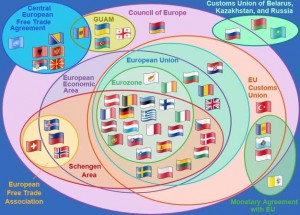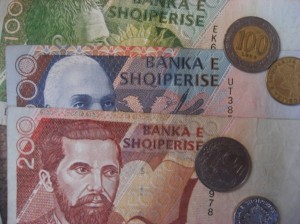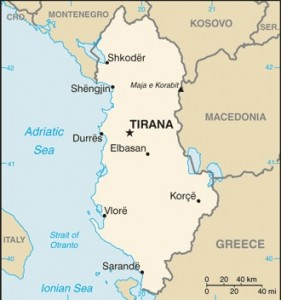Recently, on the 27th of June 2014 the Republic of Albania saw its status elevated from ‘potential candidate’ to ‘candidate country’ to join the European Union. The question whether this is something positive or negative, good or bad remains a much heated and lengthy debate between those who trust in or those who are sceptic of the European Union. However, using the misconceptions of both sides, what could correctly be stated?
 Some people for instance state that citizens of ‘candidate countries’ are able to freely move to other member states of the European Union. These people often point to the Schengen Agreement as the cause for this migration. However, this would be confusing two main concepts. Regardless whether a country has signed the Schengen Agreement, every citizen of the European Union is able to live and retire in any of the other member states: they all have freedom of movement. The Schengen Agreement then, simply abolishes all types of border controls between their international borders, unless they have an opt out or unless their bid for participation in the Schengen Area has not yet been approved by the European Parliament or the Council of Ministers.
Some people for instance state that citizens of ‘candidate countries’ are able to freely move to other member states of the European Union. These people often point to the Schengen Agreement as the cause for this migration. However, this would be confusing two main concepts. Regardless whether a country has signed the Schengen Agreement, every citizen of the European Union is able to live and retire in any of the other member states: they all have freedom of movement. The Schengen Agreement then, simply abolishes all types of border controls between their international borders, unless they have an opt out or unless their bid for participation in the Schengen Area has not yet been approved by the European Parliament or the Council of Ministers.
Much of the confusion might come from Iceland, a ‘candidate country’, to and from which citizens of both the EU and Iceland can move freely. However, this happens because, unlike Albania, Iceland together with Norway, Liechtenstein and the EU is part of the European Economic Area, which is the actual area in which there is freedom of movement. That is to say, within the EEA all citizens of member countries are able to freely choose where to live and retire. So, will we see an increased, legal migration to and from Albania any time soon? –Not likely.
A second misconception is that once a country becomes a ‘candidate country’ it has also the right to print and use the euro. While a country’s political measures to become a part of the European Union might coincide in measures taken to make it join the Eurozone, this is not mandatory. ‘Candidate countries’ are allowed to enter the European Union without having the right to be a part of the Eurozone. Examples of which are Poland, the Czech Republic and Hungary.
 In order for Albania to become a member of the Eurozone upon becoming a member of the European Union, it must do three things. Firstly, it must decrease its government deficit from 6.1% to under 3%; secondly, it must drop its debt to GDP ratio from 70.5% to under 60%; and lastly it must shrink its inflation from its current percentage of 1.7 to at best around 1,5 percent. (note: all of these figures come from the 2013 estimations from the CIA The World Factbook)
In order for Albania to become a member of the Eurozone upon becoming a member of the European Union, it must do three things. Firstly, it must decrease its government deficit from 6.1% to under 3%; secondly, it must drop its debt to GDP ratio from 70.5% to under 60%; and lastly it must shrink its inflation from its current percentage of 1.7 to at best around 1,5 percent. (note: all of these figures come from the 2013 estimations from the CIA The World Factbook)
Considering these three prerequisites to join the Eurozone, it becomes unlikely for Albania to become a part of the Eurozone within the first years of its admittance to the European Union. Out of the ten countries that became members of the European Union in 2004 for instance only six have entered the Eurozone and those only between 2008 and 2014.
A final misconception is that non-EU member states, especially those in Eastern Europe, are impoverished and backward countries. Most popular images might include a fragment of the 2004 movie Eurotrip. In this movie Slovakia, at the time recently admitted to the EU, was portrayed as a desolate place, where technology and broadcasting shows were several years behind, and, where $1,83 was enough to rent an entire suite in a five-star hotel. So, considering this negative stereotype, what does this say about the political and economic state of Albania in 2014?
Generally it could be said that the European Union is foremost a democratic political and developed economic union. Since EU membership has only been made available to democratic countries, what could be said of the stereotypical dictatorships in the east of Europe? According to The Economist Intelligence Unit’s Democracy Index, Albania is not a dictatorship. It is categorized as a ‘Hybrid Regime’ with an overall score of 5.91, which is just 0.09 points shy of being called a ‘democracy’. It also puts Albania on par with its fellow ‘candidate country’ Turkey. The next ‘candidate country’ on this list is Montenegro, with an overall score of 6.57 being categorized as a ‘Flawed Democracy’, and the first EU member to follow is Croatia with an overall score of 7.04, still categorized as a ‘Flawed Democracy’.
 Economically speaking, it could be said that the country is doing well, it is certainly not backwards. As previously stated, Albania has an inflation rate of 1.7%, which is economically very sound, since most economists agree that optimum levels of inflation are between 1-3%. Furthermore, Albania a high Human Development Index score of 0.749, which is somewhat comparable with other countries in the region including EU members such as Romania (0.786) and Bulgaria (0.782).
Economically speaking, it could be said that the country is doing well, it is certainly not backwards. As previously stated, Albania has an inflation rate of 1.7%, which is economically very sound, since most economists agree that optimum levels of inflation are between 1-3%. Furthermore, Albania a high Human Development Index score of 0.749, which is somewhat comparable with other countries in the region including EU members such as Romania (0.786) and Bulgaria (0.782).
In short, Albania is not the most democratic or economically strongest country on the European continent, but it is roughly comparable with the rest of the Western Balkan. Additionally, there are figures that at least economically the country is improving each year, partly thanks to the EU Instrument for Pre-Accession Assistance funding. While full membership to the European Union might not happen within the next decade, Albania has already signed a number of agreements with the EU and is likely to eventually comply to all of the EU requirements for membership.
Written by Willem Laurentzen, AEGEE-Nijmegen

